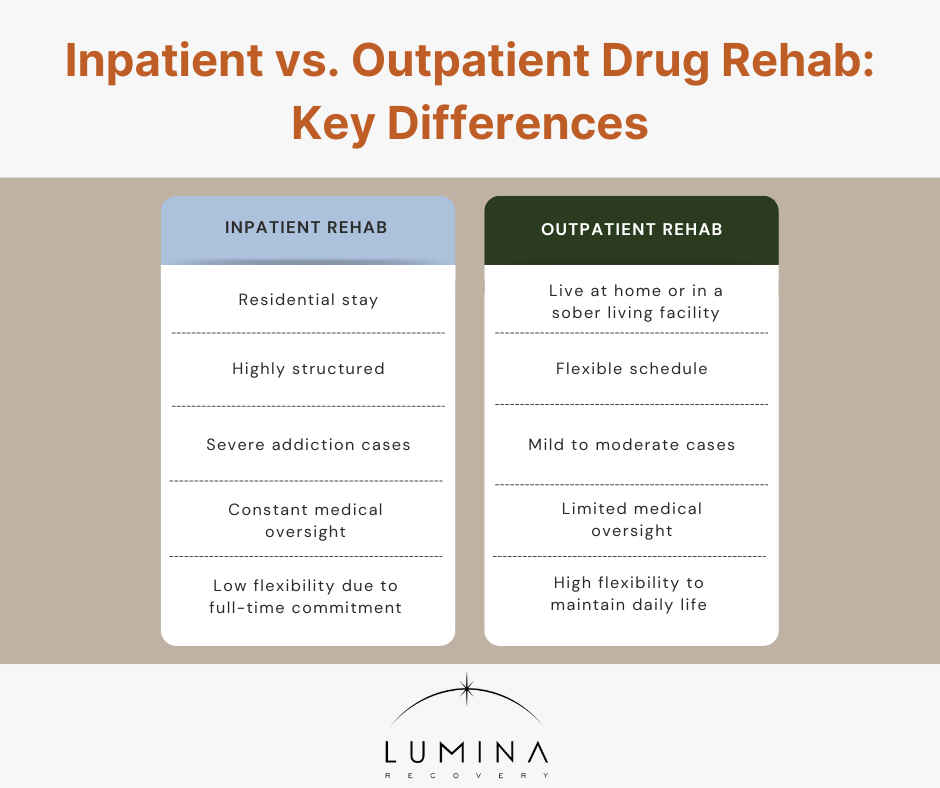Choosing the right rehab program is a crucial step in the journey toward overcoming addiction. The decision between inpatient vs. outpatient rehab can significantly impact recovery outcomes, depending on the severity of the addiction and individual needs.
This guide explores inpatient rehab vs. outpatient rehab, including their structure, treatment program lengths, benefits, and who each is best suited for. By understanding these factors, you or your loved one can make an informed decision about the best treatment option.
What Is Inpatient Rehab?
The inpatient treatment definition refers to a structured and intensive program designed for individuals struggling with severe addiction, commonly known as residential treatment. Patients live at the rehab facility for a specified period, receiving 24/7 medical supervision and support.
Typical Structure of Inpatient Rehab
- 24/7 Supervision – Constant medical and emotional support ensures safety, especially during detox and withdrawal.
- Residential Stay – Patients reside at the treatment facility, away from triggers and distractions.
- Structured Daily Routine – Therapy sessions, group counseling, and wellness activities are scheduled throughout the day.
- Comprehensive Therapeutic Support – Inpatient programs integrate medical detoxification, psychological therapy, and aftercare planning to ensure holistic healing.
Types of Inpatient Programs
- Medical Detox Centers – Designed for managing withdrawal symptoms under medical supervision.
- Short-Term Inpatient Rehab – Typically lasts 28 to 30 days and focuses on detox and stabilization.
- Long-Term Inpatient Rehab – Lasts 60 to 90 days, ideal for individuals with long-term addiction.
- Dual Diagnosis Treatment – Addresses co-occurring mental health disorders alongside addiction recovery.
What Is Outpatient Rehab?
The outpatient rehab definition refers to a more flexible approach to addiction treatment, allowing individuals to live at home while attending scheduled therapy sessions. This option is suitable for those with mild to moderate addiction and reliable support systems.
Different Levels of Outpatient Care
- Partial Hospitalization Program (PHP) – A structured program requiring several hours of therapy per day.
- Intensive Outpatient Program (IOP) – A step down from PHP, offering several therapy sessions per week.
- Standard Outpatient Treatment – Weekly sessions focused on relapse prevention and counseling.
- Telehealth and Virtual Therapy – Increasingly popular, providing remote therapy options for added flexibility.
Inpatient vs. Outpatient Drug Rehab: Key Differences
How do residential and outpatient rehab programs compare? The key difference between inpatient and outpatient rehab is the intensity of care provided and where the individual resides during treatment. Outpatient vs. inpatient therapy options cater to different levels of addiction severity, making the choice an essential factor in successful recovery.
Inpatient rehab provides 24/7 medical supervision within a residential setting, ensuring constant support and a structured environment that removes external triggers. This option is best suited for individuals with severe addiction who require intensive therapy and monitoring.
Meanwhile, outpatient rehab offers increased flexibility, allowing individuals to stay at home or in a sober living facility while attending scheduled therapy sessions. This treatment option is ideal for those with mild to moderate addiction, as it allows them to maintain family, school, or work responsibilities while receiving necessary support.
Pros and Cons of Each Treatment Option
Choosing between inpatient vs. outpatient drug treatment requires understanding the advantages and challenges of each approach. Both inpatient and outpatient rehab offer effective recovery paths, but the right choice depends on the severity of addiction, lifestyle commitments, and support systems.
Inpatient Rehab
Pros:
- 24/7 medical and emotional support
- Structured environment eliminates triggers
- Higher success rate for severe cases
Cons:
- Higher costs
- Time commitment (weeks to months)
- Limited personal freedom
Outpatient Rehab
Pros:
- Lower costs
- Maintain daily responsibilities (work, family, school)
- Access to community and support networks
Cons:
- Higher risk of relapse due to exposure to triggers
- Less intensive support
- Requires strong personal discipline
Which Option Is Right for You?
Choosing between inpatient and outpatient rehab can be difficult, as each offers unique benefits based on individual needs. Factors such as addiction severity, personal responsibilities, and financial considerations all play a role in determining the best course of action.
When to Choose Inpatient Rehab
- You have a severe addiction or have experienced multiple relapses.
- You require medical detox and intensive therapy.
- Your home environment lacks support or exposes you to triggers.
When to Choose Outpatient Rehab
- You have a mild to moderate addiction.
- You have family, school, or work responsibilities to maintain.
- You have a stable home environment with strong support.
Seeking Professional Guidance
If unsure, consulting with a professional can help determine the best treatment path based on your specific needs. A specialist can assess your situation and recommend the most suitable program to support your long-term recovery.
FAQs
What is the difference between inpatient and outpatient rehab?
Inpatient rehab involves residing at a treatment facility 24/7, providing intensive care and supervision. Outpatient rehab gives individuals the opportunity to stay at home while attending scheduled treatment sessions, offering more flexibility.
Is a rehab center inpatient or outpatient?
Rehab centers can offer both inpatient and outpatient programs, depending on the level of care needed.
What is inpatient therapy?
The inpatient therapy definition refers to treatment programs where individuals reside at the facility and receive intensive care, including medical supervision, therapy, and holistic support.
What is an inpatient rehabilitation facility?
An inpatient rehabilitation facility is a specialized center that provides 24-hour medical and therapeutic care for individuals recovering from addiction, trauma, or other medical conditions.
Begin Your Recovery Journey With Lumina Recovery
Choosing between inpatient and outpatient rehab is a significant decision in the recovery journey. Inpatient rehab provides intensive care in a structured setting, ideal for severe addiction, while outpatient rehab offers flexibility for those with mild to moderate addiction.
At Lumina Recovery, we offer both inpatient and outpatient treatment programs tailored to your unique needs. Whether you require residential treatment with 24/7 support or a flexible outpatient program, our experienced team is here to help.
Take the first step toward recovery today. Contact us to explore your treatment options and start your journey toward a healthier, substance-free life.




